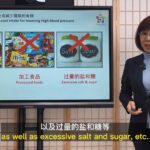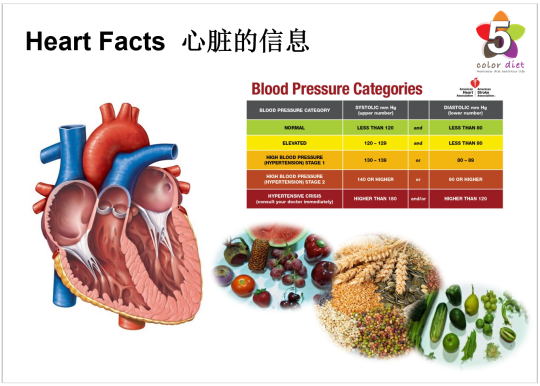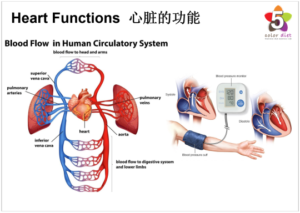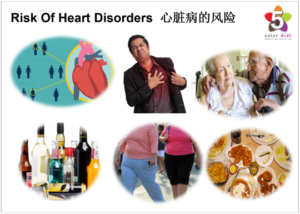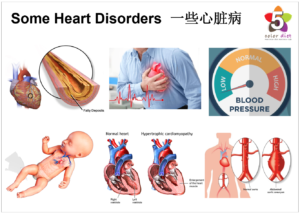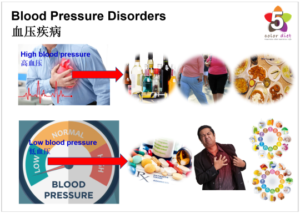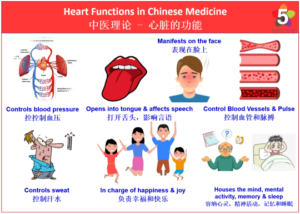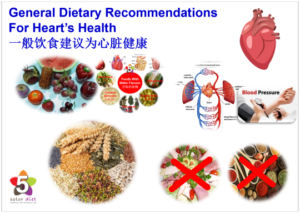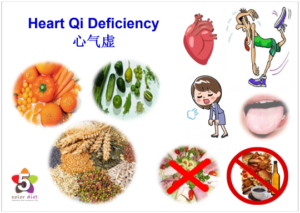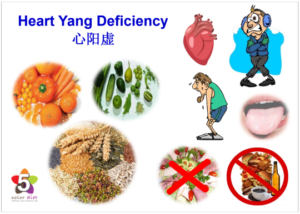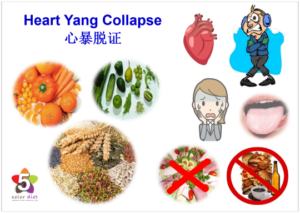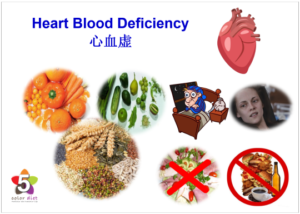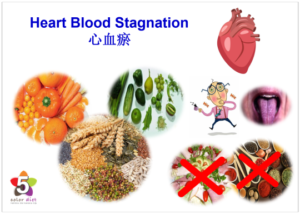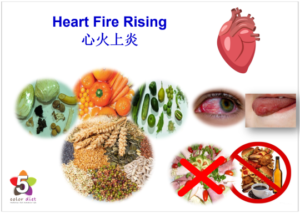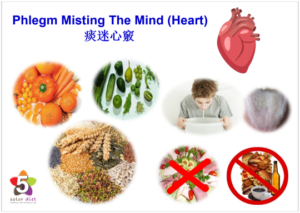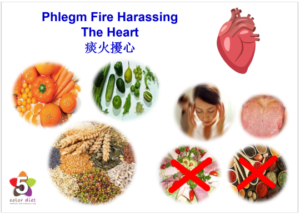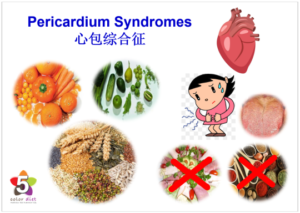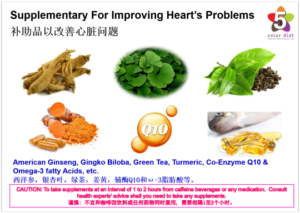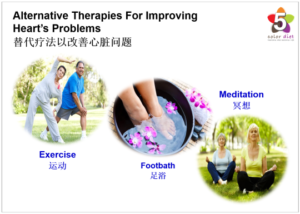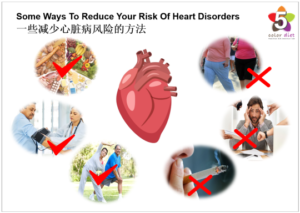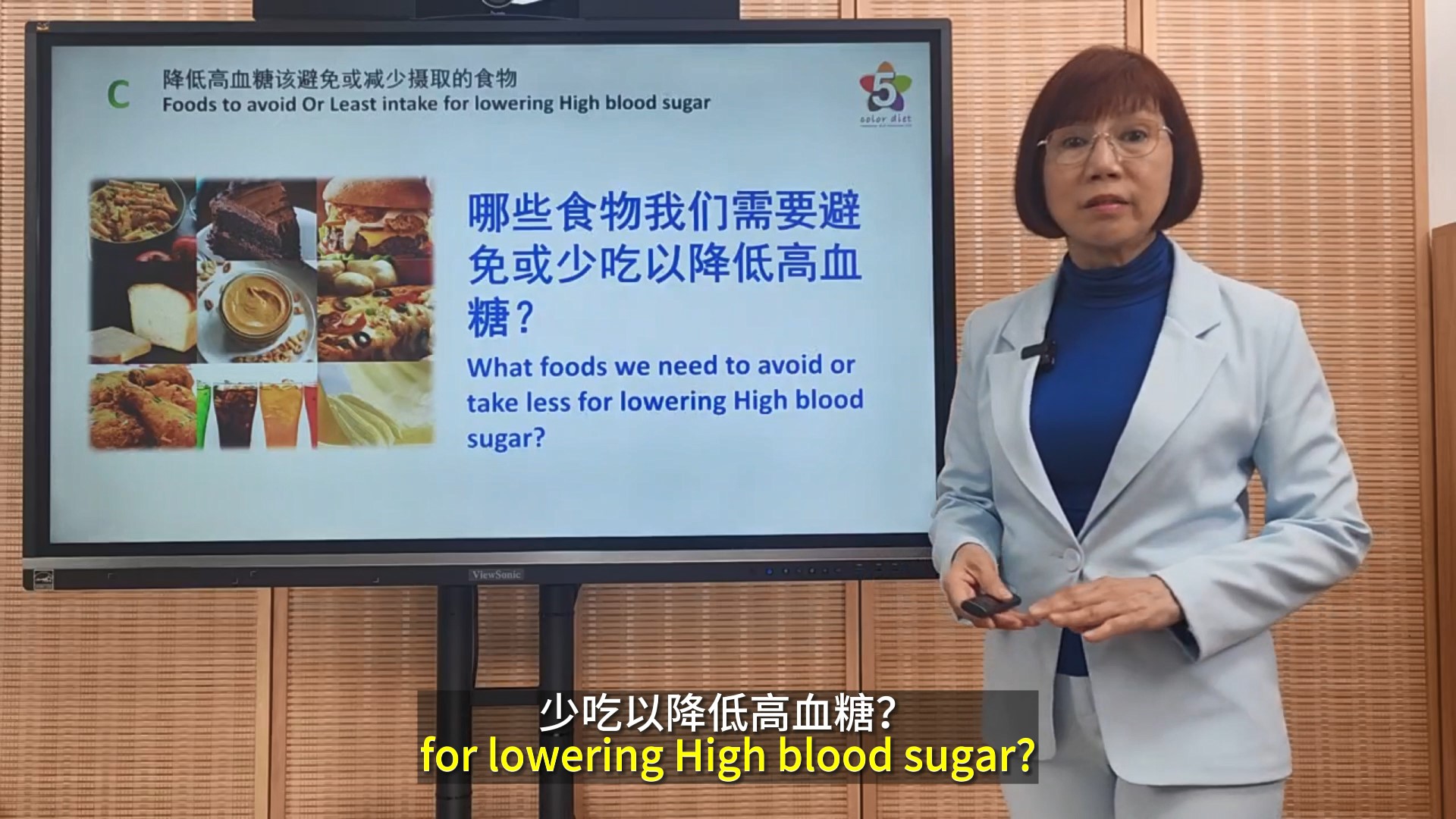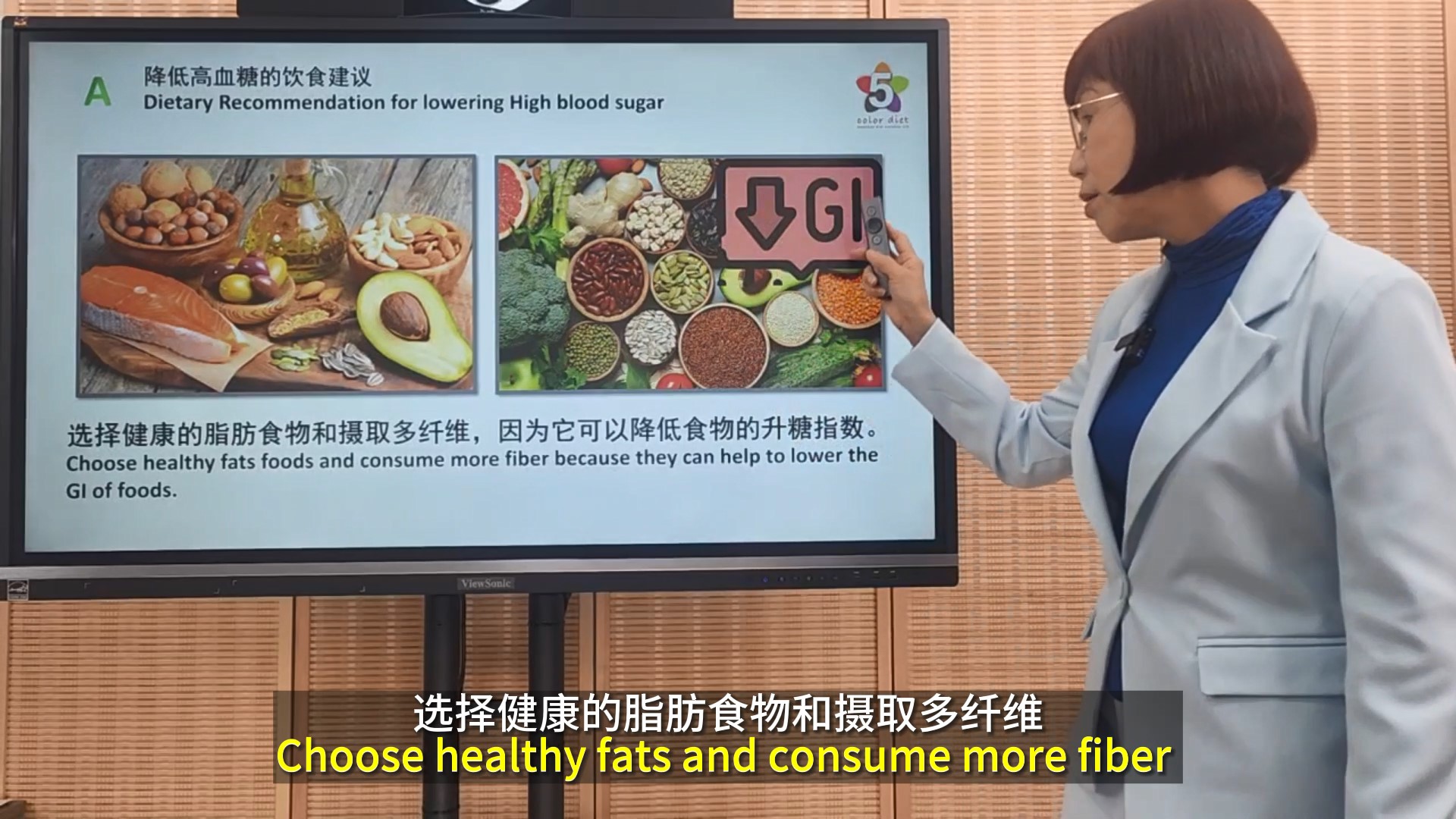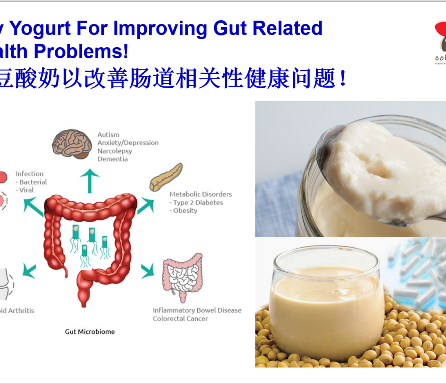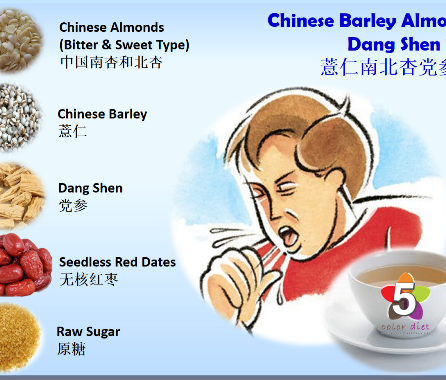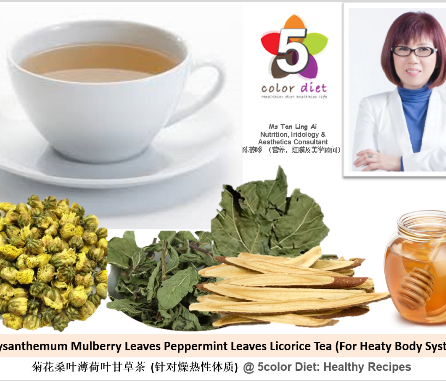
Heart Overview
The heart is a muscle just a bit bigger than the size of your fist. It is located between the lungs, almost in the middle of the chest. It is the body’s core muscle and the very first organ to form in the body after conception. It weighs between about 280 to 340 grams in men and 230 to 280 grams in women. With each beat, the heart pumps about 6 quarts (5.7 liters) blood through the body’s cardiovascular system. This is made up of the heart and a system of blood vessels that help circulate blood (the circulatory system). The blood provides oxygen and nutrients to all the organs and tissues in the body and delivers carbon dioxide to the lungs, which remove it from the body. At the same time, blood picks up waste products that are filtered out of the body by the kidneys.
The heart beats about 100,000 times per day. You can feel a pulse, the rhythmic beating of the heart, each time the ventricle contracts by touching your index and middle finger (not your thumb) to your wrist or the side of your neck. To figure out what your “heart rate” is, keep your fingers on your pulse and count the beats for 10 seconds, then multiply by 6. An adult’s heart rate is about 60 to 80 beats per minute. A new-born’s heart rate is about 130 to 160 beats. A 6-month-old’s heart rate is about 100 beats. A toddler’s heart rate is about 70 to 80 beats.
Blood pressure is a measure of the pressure of the blood against the walls of the arteries. It is expressed as a fraction. Blood pressure indicates how well the heart is pumping. Different factors can cause blood pressure to be too high or too low. Sometimes these factors are heart-related conditions (Eg: Atherosclerosis, arrhythmia, cardiac arrest, high cholesterol, heart disease or stroke, etc) but sometimes they may be related to other health problems.
To measure your blood pressure, puts a blood pressure cuff on your arm. The first number measured is the systolic pressure. This is the pressure as the heart pumps blood out. The second number is the diastolic pressure. This is the pressure as the heart relaxes and refills with blood. An average adult blood pressure is 120/80. That means 120 systolic and 80 diastolic. While children’s blood pressures vary with age. Some typical values are:
- A new-born baby: 75/50.
- A toddler: 96/65.
- A pre-schooler: 100/60.
- A school-age child (6 to 8 years): 105/60.
- A teenager: 118/60.
Risk of Heart Disorders
(1) There are several risk factors for heart disease, some are controllable while others are not. Uncontrollable risk factors for heart disease include:
- Family history of heart disease.
- Male sex.
- Older age.
- Postmenopausal women.
- Race (African-Americans, American Indians, and Mexican Americans are more likely to have heart disease than Caucasians).
(2) Still, there are many heart disease risk factors that can be controlled. By making changes in your lifestyle, you can actually reduce your risk for heart disease. Controllable risk factors for heart disease include:
- Alcohol use.
- High C-reactive protein.
- High low-density lipoprotein (LDL), or “bad” cholesterol, and low high-density lipoprotein (HDL), or “good” cholesterol.
- Obesity (having a BMI greater than 25).
- Physical inactivity.
- Poor diet.
- Smoking.
- Uncontrolled diabetes.
- Uncontrolled high blood pressure.
- Uncontrolled stress, depression, and anger, etc.
Some Heart Disorders
Heart disorders include conditions that affect the structures or function of your heart, such as:
- Coronary artery disease (narrowing of the arteries).
- Heart attack.
- Abnormal heart rhythms, or arrhythmias.
- Heart failure.
- Heart valve disease.
- Congenital heart disease.
- Heart muscle disease (cardiomyopathy).
- Pericardial disease.
- Aorta disease and Marfan syndrome.
- Vascular disease (blood vessel disease).
Blood Pressure Disorders
When a disease state causes blood pressure to stay persistently high, low, or erratic, problems can arise. The most common blood pressure disorders are high blood pressure (hypertension) and low blood pressure (hypotension). Both have many causes and can range in severity from mild to dangerous.
(1) Hypertension
Hypertension occurs when blood pressure within the arteries puts too much mechanical stress on the artery walls. This causes the heart to work harder. It also leads to unhealthy tissue growth within the walls of the arteries, and thickening and weakening of the heart muscle.
A blood pressure reading of 140/90 mm Hg is generally considered to be hypertensive.
Unless long-standing and untreated, hypertension doesn’t usually cause any noticeable symptoms.
Causes Of High Blood Pressure
Often no cause for chronic high blood pressure can be identified, but sometimes it occurs as a result of an underlying disorder of the kidneys or hormones. Other risk factors include:
- A sedentary lifestyle.
- Excessive amount of alcohol or salt in the diet.
- Obesity.
- Smoking.
- Stress.
Complications Of Hypertension
Over time, even mild hypertension can increase the risk of atherosclerosis, stroke, aneurysm, heart failure, heart attack, and kidney damage. Left untreated, chronic high blood pressure can cause progressive damage to one or more vital organs.
(2) Hypotension
When arterial pressure and blood flow decrease far enough, low blood pressure can occur. Although blood pressure varies from person to person, a blood pressure reading of 90/60 mm Hg is generally considered low. Hypotension is a medical concern if it causes symptoms such as the following:
- Blurred vision.
- Cold, clammy, pale skin.
- Depression.
- Dizziness or light-headedness.
- Fainting.
- Fatigue.
- Lack of concentration.
- Nausea.
- Rapid, shallow breathing.
- Thirst.
- Severely low blood pressure can deprive your body of oxygen, leading to damage to your heart and brain.
Causes Of Low Blood Pressure
The causes of low blood pressure range from minor to serious. They include:
- Certain medications.
- Dehydration.
- Eating disorders, particularly anorexia nervosa and bulimia.
- Endocrine problems.
- Heart problems such as low heart rate (bradycardia), heart valve problems, heart attack, and heart failure.
- Hemorrhage.
- Lack of nutrients in your diet eg: Vitamin B12, Vitamin C, Calcium, Folic Acid (Vitamin B9), Iron & Proteins, etc.
- Pregnancy.
- Sepsis.
- Shock.
- Toxins, including toxic doses of blood pressure medicine.
-
Chinese Medicine Theory On Heart Facts
In Chinese Medicine, the heart governs the blood & vessels and is the seat of the mind & spirit. Generally, external pernicious influences do not affect the heart directly, instead, they typically attack the pericardium, the sac around the heart known in Chinese Medicine as the ‘heart protector’. The pericardium is considered the sixth Yin organ, but its functions are typically linked with the heart. The shield between the heart and the exterior, the pericardium protects the heart from the invasion of external pathogenic factors. In almost all disharmonies of the heart, palpitations are a key symptom. This pounding of the heart occurs in both excess and deficiency patterns.
While Sadness relates to the Lungs in 5 Element Theory, Sadness affects the Heart Qi too because the Heart and Lungs are closely related and mutually assist each other. Sadness weakens Lung Qi which can cause Heart Qi to become deficient. Prolonged sadness and Deficient Qi can also lead to Stagnation of Qi, which can lead to Heart Fire. While Anger affects the Liver directly, it affects the Heart indirectly. Anger causes Liver Yang to rise, which can eventually be transmitted to the Heart, causing Heart Fire.
Traditional Chinese Medicine recognizes the links between lifestyle, cholesterol levels and coronary heart disease, by using the metaphor of Phlegm to describe this condition. According to Traditional Chinese Medicine, Phlegm is created when we eat a poor diet or when our digestive system is not working optimally. Phlegm can obstruct the proper flow of Qi and Blood in the body. For some people, this can lead to chest pain or even heart attacks.
Traditional Chinese Medicine uses several different metaphors to describe the processes involved in hypertension. One of the most important ones considers the balance of Yin and Yang in the body. According to Traditional Chinese Medicine theories, Yin and Yang are complementary opposites that keep each other in balance. Yin is considered to be solid and heavy, while Yang is seen as fluid and light. If there is not enough Yin to anchor Yang, then Yang will float upwards. In the case of hypertension, aging and chronic stress are things that consume Yin thus leaving Yang unanchored. As Yang floats upward, blood pressure will rise which will cause the risks of coronary heart disease and stroke.
In Chinese medicine, Blood imbalances are associated with a variety of causes:
(1) Heart Qi Deficiency
(2) Heart Yang Deficiency
(3) Heart Yang Collapse
(4) Heart Blood Deficiency
(5) Heart Blood Stagnation
(6) Heart Yin Deficiency
(7) Heart-Fire Rising
(8) Hot Phlegm Confusing the Heart
(9) Phlegm Misting the Heart Opening
(10) Pericardium Syndromes.
Refer to the recommended dietary recommendations at these heart problems’ specific pages.
Taking the right food sources & herbs by identifying which heart’s imbalances you experience is one way to help eliminate toxic substances from the cardiovascular system naturally & improve cardiovascular system’s health. The detoxification systems of our body need to be in priority order because each organ need to cleanse its toxins or the toxins will spread to other organs. Advisable to follow the detoxification system’s in priority order…..
-
General Dietary Recommendations For Heart’s Health
Choosing the right diet is one way to better heart’s health.
Particulars Description Causes Of Heart Toxicity Ageing (Especially in people over the age of 50 & above), depression, diabetes, genetic, high blood pressure, high cholesterol, menopausal women, obesity, sedentary lifestyle & smoking & unhealthy diet (Eg: Excessive alcohol intake, greasy foods, processed foods & high salt intake), etc. Also, men are more likely to develop cardiovascular disease (CVD) at an earlier age than women. Symptoms Of Heart Toxicity Cold sweat, dizziness or light-headedness, fainting, fatigue, nausea, shortness of breath, pains or pressure in the chest, which may indicate angina or pain or discomfort in the arms, the left shoulder, elbows, jaw, or back, etc. Recommended Food Sources For Improving Heart’s Health ● Red fruits & vegetables eg: Beets, blood oranges, cherries, cranberries, red guava, kidney beans, red beans, red grapefruit, pomegranates, raspberries, red apples, red cabbage, red grapes, red onions, red pears, red peppers, red-skinned potatoes, red tomatoes, strawberries & watermelon, etc. ● In addition, take food sources with Bitter flavour as well. (Eg: asparagus, bitter-gourd, Chinese almonds, lily bulb, lotus leaves, lotus plumule, pomelo, tea leaves & seaweed, etc)
● Food diet should comprise of Proteins only 20%, Complex carbohydrates 30-40% like grains and starchy root vegetables & Cooked vegetables 50% & more.
Foods To Avoid Or Least Intake For Improving Heart’s Health ● Alcohol, caffeinated & carbonated beverages, cold raw foods (Eg: iced drinks, salads or white/ tan & brown fruits & vegetables), dairy products (Eg: butter, cheese, eggs & milk except yogurt), greasy foods, preserved foods, processed foods, refined sugars (Eg: biscuits, cakes & pastries), high salt intake, etc. ● Moderate intake of Red fruits & vegetables for those whose body system are heaty and with high blood pressure because most red color fruits & vegetables has warm energy which may decrease the energy level.
● Excessive intake of Bitter foods for people with Qi deficiency (low energy) because these foods may weaken energy levels and cause dry mouth.
● Avoid smoking & stress.
-
Dietary Recommendations For Heart Qi Deficiency
This imbalance may be seen after blood loss, from emotional problems, heart disease, arrhythmia, neurosis, and heart failure. This imbalance can correspond to chronic fatigue, neurasthenia (chronic mental and physical weakness), or heart disease involving the muscle, valves, or vessels. Palpitations are the key symptom in this Heart Qi Deficiency. Severe blood loss from hemorrhage or long-term illness can deplete Heart blood (Heart rules Blood), and this can lead to Heart Qi Deficiency.
Qi and Yang are closely related to each other in Traditional Chinese Medicine (TCM). Qi enables our bodies to move and our organs to do their functions. Yang warms and activates the body. Qi deficiency requires that Qi building foods be eaten. Yang deficiency means that both Qi and Yang need to be replenished.
-
Dietary Recommendations For Heart Yang Deficiency
This imbalance may be seen indirectly from Kidney Yang deficiency (Eg: chronic illness, excess sexual activity especially if exposed to cold after intercourse, chronic retention of Dampness, old age), after blood loss, from emotional problems, various physical heart diseases, heart failure, or circulatory failure caused by various acute or chronic diseases. Because the Kidneys are the source of Yang for all the internal organs, chronic Kidney Yang Deficiency can lead to Heart Yang Deficiency. A deeper, more serious condition than Qi deficiency, Heart Yang deficiency typically corresponds to a Western diagnosis of true heart disease.
Qi and Yang are closely related to each other in Traditional Chinese Medicine (TCM). Qi enables our bodies to move and our organs to do their functions. Yang warms and activates the body. Qi deficiency requires that Qi building foods be eaten. Yang deficiency means that both Qi and Yang need to be replenished.
Particulars Description Causes Of Heart Yang Deficiency ● Aging. ● Chronic diseases.
● Vacuous Heart qi from over-taxation will turn in time in to Vacuity and Weakness of Heart Yang.
● Vacuity and Weakness of Kidney Yang.
Symptoms Of Heart Yang Deficiency Bright pale face, cold limbs especially the hands, cyanosis of nails, discomfort in the chest & heart area, fatigue, palpitations, sensation of cold, shortness of breath & sweating, etc. Tongue: Pale color, wet & swollen tongue.
Recommended Food Sources For Improving Body Imbalance Related To Heart Yang Deficiency ● Bean: Black beans, black sesame seeds, chestnuts, chick peas, pistachios & walnuts, etc. ● Fruits: All berries, dates, stewed fruits, especially most dark green/ black/ purple/ blue/ orange & yellow color fruits, etc.
● Grains: Cooked grains, hulled wheat, oats & roasted barley, etc.
● Herbs & Spices: Black pepper, coriander, cinnamon, cloves, fennel, fenugreek, garlic, ginger, nutmeg, onions, parsley, rosemary, spring onions, star anise & turmeric, etc.
● Meat & Seafood: All seafood. Moderation for white & red meat etc.
● Vegetables: Carrots, chives, green peas, leeks, parsnips, pumpkin, sweet potatoes, turnips, yam, especially most dark green/ black/ purple/ blue/ orange & yellow color vegetables, etc.
● Others: Soups & Teas (Eg: Cinnamon, fennel, fenugreek, ginger, nutmeg, rosemary & turmeric, etc). Moderation for blackstrap molasses, maltose & rice syrup, etc.
● Food diet should comprise of Proteins only 10-20%, more on Complex carbohydrates like grains and starchy root vegetables & Cooked vegetables 30-40%.
Avoid or Least Intake Of Foods For Improving Body Imbalance Related To Heart Yang Deficiency ● Alcohol, caffeine beverages, carbonated beverages, citrus fruits, cold & raw foods (Eg: iced drinks, raw meat, salads or white/ tan & brown fruits & vegetables), dairy products (Eg: butter, cheese, eggs & milk except yogurt), fried or greasy foods, glutinous rice, peanuts, processed foods, salt, seaweed, spinach, sprouts, soybean products, tomatoes, vinegar, wheat products & refined sugars (Eg: biscuits, cakes & pastries), etc. ● Avoid smoking & stress.
-
Dietary Recommendations For Heart Yang Collapse
A more severe version of Heart Yang deficiency, Heart Yang Collapse produces all the symptoms of Qi and Yang deficiency plus copious cold sweats, extreme cold in the limbs, very weak breathing, a minute pulse, and abnormal Shen that precedes a comatose state. Corresponding Western diagnoses are shock or heart attack, so this syndrome requires hospitalization.
Qi and Yang are closely related to each other in Traditional Chinese Medicine (TCM). Qi enables our bodies to move and our organs to do their functions. Yang warms and activates the body. Qi deficiency requires that Qi building foods be eaten. Yang deficiency means that both Qi and Yang need to be replenished.
Particulars Description Causes Of Heart Yang Collapse ● Aging. ● Chronic diseases.
● Vacuous Heart qi from over-taxation will turn in time in to Vacuity and Weakness of Heart Yang.
● Kidney Yang deficiency.
Symptoms Of Heart Yang Collapse Bright pale face, cold limbs especially the hands, cyanosis of nails, discomfort in the chest & heart area, fatigue, palpitations, sensation of cold, sweating & weak breathing, etc. Tongue: Pale color, wet & swollen tongue.
Recommended Food Sources For Improving Body Imbalance Related To Heart Yang Collapse ● Bean: Black beans, black sesame seeds, chestnuts, chick peas, pistachios & walnuts, etc. ● Fruits: All berries, dates, stewed fruits, especially most dark green/ black/ purple/ blue/ orange & yellow color fruits, etc.
● Grains: Cooked grains, hulled wheat, oats & roasted barley, etc.
● Herbs & Spices: Black pepper, coriander, cinnamon, cloves, fennel, fenugreek, garlic, ginger, nutmeg, onions, parsley, rosemary, spring onions, star anise, turmeric, Dang Shen & Ginseng, etc.
● Meat & Seafood: All seafood. Moderation for white & red meat etc.
● Vegetables: Carrots, chives, green peas, leeks, parsnips, pumpkin, sweet potatoes, turnips, yam, especially most dark green/ black/ purple/ blue/ orange & yellow color vegetables, etc.
● Others: Soups & Teas (Eg: Cinnamon, fennel, fenugreek, ginger, nutmeg, rosemary & turmeric, etc). Moderation for blackstrap molasses, maltose & rice syrup, etc.
● Food diet should comprise of Proteins only 10-20%, more on Complex carbohydrates like grains and starchy root vegetables & Cooked vegetables 30-40%.
Avoid or Least Intake Of Foods For Improving Body Imbalance Related To Heart Yang Collapse ● Alcohol, caffeine beverages, carbonated beverages, citrus fruits, cold & raw foods (Eg: iced drinks, raw meat, salads or white/ tan & brown fruits & vegetables), dairy products (Eg: butter, cheese, eggs & milk except yogurt), fried or greasy foods, glutinous rice, peanuts, processed foods, salt, seaweed, spinach, sprouts, soybean products, tomatoes, vinegar, wheat products & refined sugars (Eg: biscuits, cakes & pastries), etc. ● Avoid smoking & stress.
-
Dietary Recommendations For Heart Blood Deficiency
This imbalance is usually associated with a Spleen/ Pancreas Qi deficiency (Eg: Poor diet not creating enough blood or damaging the Spleen/pancreas function), anemia, arrhythmia, hypertension, hyperthyroidism, anxiety, worry or blood, etc. Chronic worry and anxiety disturb the Shen, which depresses the Heart function and leads to Heart Blood Deficiency.
Blood deficiency in Traditional Chinese Medicine (TCM) is a broader term than simply anemia. Like Yin, Blood in Traditional Chinese Medicine (TCM) refers to the body’s overall fluids and nourishment. A diagnosis of Heart Blood deficiency means that this aspect of the Heart organ network is compromised. To address this, a diet that is nutrient rich and building is recommended.
Particulars Description Causes Of Heart Blood Deficiency ● Heavy blood loss, e.g. someone with consistently heavy menstruation ● Prolonged habitual profuse sweating, eg: someone who works out all the time or sits in the sauna all the time.
● Chronic worry and anxiety disturb the Shen, which depresses the Heart function and leads to Heart Blood Deficiency.
● Severe hemorrhage (eg: in childbirth) or any cause of Deficient Blood.
● All emotions potentially affect the Heart energy and strong emotions even more so like long-term of fear, worry, grief, anxiety, all of these emotions will affect the Shen and the Heart energy.
● Blood Loss: (1) A loss or haemorrhage of blood depletes Blood throughout the body including Heart Blood. The faster it happens, the more obvious the signs, but anyone who has a steady small, perhaps unnoticed, haemorrhage will eventually be affected. Such losses might be in the bowels or small intestine, or from taking a drug which diminishes or prevents blood clotting.
(2) Blood losses from heavy periods, surgery, wounds, and during childbirth can all lead to Heart Blood deficiency – often a major contributor to post-natal depression.
● Poor nutrition like poor food choices or poor eating habits and/or inability to absorb the nutritive benefit of food because of weak Spleen Qi mean poorly nourished blood: that gives deficient Blood, and therefore potential for or likelihood of Heart Blood deficiency.
● There are other causes of Blood deficiency, which leads on to Heart Blood deficiency, including excessive exercise or physical work, weakening your Spleen Qi and leading to both Blood stagnation and Qi Stagnation in the pelvic area. Some athletes, (mainly women, but also men who have over-strained their bodies) may find that they get some of the symptoms of this syndrome, with or without Blood deficiency.
Women with Heart Blood deficiency from this cause would probably find their periods diminishing in volume, but men might not be aware of Blood deficiency, just aware that they were getting mild palpitations and some of the other symptoms listed: anxiety, confused, flustered, memory lapses, tearful, guilty, easily startled, loss of libido, mild dizziness, mild tinnitus, tiredness, palpitations, scanty menses, infertility, difficult falling asleep, disturbed sleep. Tongue: pale, thin, often dry, with possibly a long midline crack.
● Also arise from Liver Blood deficiency. Anger affects the Liver more than the Heart, but after anger, bitterness will affect the Heart.
Symptoms Of Heart Blood Deficiency Anxiety, dream-disturbed sleep, dizziness, dull-pale complexion, easily startled, fright palpitations, insomnia, pale lips, paranoia, poor memory, restlessness, suspiciousness, etc. Tongue: Pale color and slightly dry.
Recommended Food Sources For Improving Body Imbalance Related To Heart Blood Deficiency ● Beans: Almonds, black sesame seeds, black soybeans, cashew nuts, chick peas, Chinese almonds, fava beans, kidney beans, red beans, sesame seeds, sunflower seeds, miso paste & tempeh, etc. ● Fruits: Apple, apricot, avocado, berries, cherries, coconut, dates, figs, goji berries, grapes, longan, lychee, mulberries, stewed fruits and especially dark green/ orange/ yellow/ red/ black/ purple & blue fruits, etc.
● Grains: Cooked whole grains, amaranth, roasted barley, brown rice, buckwheat, Chinese barley, glutinous rice, millet, oats, quinoa & wheat bran.
● Herbs & Spices: Dang Shen, dong quai, garlic, ginseng, ginger, Korean ginseng, onions, parsley, turmeric & wheatgrass, etc.
● Meat & Seafood: Animal livers & kidneys, chicken, mussels, octopus, oysters, red meat, deep-sea fish (Eg: sardine & tuna), etc.
● Vegetables: Alfalfa sprouts, artichoke, beetroot, button mushrooms, carrot, corn, dandelion leaf, green peas, kale, leeks, parsnips, pumpkin, shiitake mushrooms, spinach, sweet potatoes, wheatgrass, taro root, yams and especially dark green/ orange/ yellow/ red/ black/ purple & blue vegetables, etc.
● Others: blackstrap molasses, marmite and Teas (Eg: Dang Shen, Dong Quai, ginger, ginseng, turmeric, lavender flowers & rosebuds), etc.
● Food diet should comprise of Proteins only 20-30%, Complex carbohydrates 20-30% like grains and starchy root vegetables & Cooked vegetables 30-40%.
Avoid or Least Intake Of Foods For Improving Body Imbalance Related To Heart Blood Deficiency ● Alcohol, caffeine beverages, carbonated beverages, citrus fruits, cold or raw foods (Eg: iced drinks, salads or white/ tan & brown fruits & vegetables), dairy products (Eg: butter, cheese, eggs & milk except yogurt), fried or greasy foods, processed foods, seaweed, spinach, sprouts, soybean products, tomatoes, wheat products & refined sugars (Eg: biscuits, cakes & pastries), etc. ● Avoid smoking & stress.
-
Dietary Recommendations For Heart Blood Stagnation
This imbalance closely resembles a Western diagnosis of angina pectoris. This imbalance derives from other Heart imbalances, usually Heart Yang Deficiency, sometimes Heart Blood Deficiency or Heart Fire. Signs, therefore, vary according to the origin and there will be additional symptoms depending on which imbalance was also involved. When Heart Yang is Deficient, it cannot circulate the Blood in the chest. Heart Blood then stagnates in the chest, causing pain and feeling of stuffiness. The symptoms vary widely from mild pricking to intense stabbing. Other Heart imbalances do not have this symptom. the pain is typically in bouts, worse on exertion or in Cold weather.
If Heart Fire is the cause, Heat congeals the Blood in the chest causing stagnation. If Heart Blood is Deficient, Qi can become Deficient, and eventually become unable to push the Blood. in addition, when Blood is extremely Deficient, it can stagnate.
Particulars Description Causes Of Heart Blood Stagnation ● Cold weather & being out in the cold after exercise. ● Chronic diseases eg: angina pectoris, pericarditis, coronary artery disease, myocardial infarction, etc.
● Chronic Yang deficiency.
● Emotional problems, especially anxiety, grief, resentment or repressed anger over a long period will cause Blood Stagnation in the chest. Unexpressed emotions tend to be held in the chest and interfere with the circulation of Qi and Blood.
● Chronic Liver depression and Qi stagnation, caused by anger/ stress or Qi/ Blood vacuity, can cause the blood flow in the heart to not be smooth and free-flowing. This can cause stasis and obstruction.
● Not enough Qi to move the blood, or not enough fire in the blood causing blood to thicken.Symptoms Of Heart Blood Stagnation Agitated, cold hands, dark eye rings, dark lips, fatigue, stabbing/ prickling sensation in the chest, tidal fever, hiccups, insomnia, palpitations, choking sensation when drinking water, etc. Tongue: Purple color.
Recommended Food Sources For Improving Body Imbalance Related To Heart Blood Stagnation ● Beans, Nuts & Seeds: Almonds, black beans, chestnuts, Chia seeds, Chinese almonds, flaxseeds, gingko nuts, kidney beans, pine nuts, pumpkin seeds, red beans, walnuts, soybeans, miso paste & tempeh, etc. ● Fruits: Apricot, banana, citrus fruits, hawthorn fruit, lemon, mango, papaya, peach, plum, raisins, sour jujube, sugar cane, especially most green/ orange & yellow color fruits, etc.
● Grains: Amaranth, cereals, oats, quinoa & white rice, etc.
● Herbs & Spices: Alfalfa, basil, Burdock, chives, Dang Shen, garlic, ginger, licorice, lotus leaf, onions, nutmeg, parsley, rosemary, sage, shallots, turmeric & white pepper, etc.
● Meat & Seafood: Abalone, clams, crab, fish, jellyfish, lean meat & sea cucumber, etc.
● Vegetables: Asparagus, black fungus, broccoli, Brussels sprouts, carrot, celery, Chinese radish, eggplants, kelp, leeks, mushrooms, pumpkin, seaweed, spinach, taro root, yams, zucchini especially most green/ orange & yellow color vegetables, etc.
● Others: Brown sugar, healthy oils (eg: canola oil, olive oil, safflower oil), vinegar and Teas (Eg: chrysanthemum, green tea, lavender flowers & rosebuds), etc.
● Food diet should comprise of Proteins only 10%, Complex carbohydrates 30% like grains and starchy root vegetables & Cooked vegetables 40-60%.
Avoid or Least Intake Of Foods For Improving Body Imbalance Related To Heart Blood Stagnation ● Alcohol, all nuts & seeds except those stated in Recommended food sources, caffeine beverages, carbonated beverages, chocolate, cold raw foods (Eg: iced drinks, salads or white/ tan & brown fruits & vegetables), dairy products (Eg: butter, cheese, eggs & milk except yogurt), fried or greasy foods, grains (Eg: brown rice & millet), processed foods, refined sugars (Eg: biscuits, cakes & pastries), red meat, salt, spicy foods & tomatoes, etc. ● Avoid smoking & stress.
-
Dietary Recommendations For Heart Yin Deficiency
This imbalance is often seen in individuals with chronic anxiety and those who have a hectic lifestyle. May also be seen in more in hot climates, tachycardia, arrhythmia, anemia, neurasthenia, hypertension, hyperthyroidism, and generalized anxiety disorders. A diagnosis of Heart Yin deficiency means that the reserves that nourish and supports the Heart and the mind are weakened, therefore, unable to perform their functions. A diet that includes enriching and building foods can help to preserve and restore Heart Yin.
In Traditional Chinese Medicine (TCM), the Heart Organ Network includes not only the heart muscle but also aspects of mental and emotional activity and overall blood circulation. The Yin of the body helps to regulate and nourish this organ network.
Particulars Description Causes Of Heart Yin Deficiency ● Aging. ● Chronic anxiety, worry, and a busy lifestyle can damage Yin and cause Yin Deficiency.
● Chronic diseases.
● External-heat-pathogen diseases consuming the Body Fluids can exhaust the Yin of the heart, usually only in countries with very hot climate.
Symptoms Of Heart Yin Deficiency Anxiety, dry mouth & throat, tidal fever, dream-disturbed sleep, easily startled, “five palm heat”, insomnia, mental restlessness, night sweats, palpitations, poor memory, red cheeks & ears, sensation of Heat in the evening, etc. Tongue: Red color with no coating & possible red tip.
Recommended Food Sources For Improving Body Imbalance Related To Heart Yin Deficiency ● Beans: All nuts & seeds, beancurd, bean sprouts, adzuki beans, mung beans, miso paste & tempeh, etc. ● Fruits: Apples, banana, coconut, grapes, melons, mulberries, peaches, pears, plums, pomegranate, raisins, especially most white/ tan & brown color fruits, etc.
● Grains: Barley, Chinese barley, millet, oats, wheat & white rice, etc.
● Herbs & Spices: American ginseng, Cordyceps, Dang Shen, mulberry leaves & wheatgrass, etc.
● Meat & Seafood: All seafood & white meat.
● Vegetables: Beets, black fungus, cabbage, carrots, celery, kelp, lettuce, lily bulbs, lotus root, mushrooms, pumpkin, seaweed, spinach, string beans, sweet potatoes, tomatoes, wheatgrass, white fungus, zucchini, especially most white/ tan & brown color vegetables, etc.
● Others: Blackstrap molasses, honey, marmite, vegemite, dairy products in moderation (Eg: eggs, milk & yogurt), healthy oils (Eg: almond oil, flaxseed oil, olive oil) and Teas (Eg: Chinese barley, mulberry leaves & peppermint), etc. Advisable to drink water, fruit juices & soups regularly.
● Food diet should comprise of Proteins only 10-20%, more on Complex carbohydrates like grains and starchy root vegetables & Cooked vegetables 40%.
Avoid or Least Intake Of Foods For Improving Body Imbalance Related To Heart Yin Deficiency ● Alcohol, caffeine beverages, carbonated beverages, citrus fruits, pickles, pungent herbs (Eg: Basil, capsicum, cinnamon, cloves, garlic, ginger, horseradish, leeks, onions, shallots, turmeric), red meat, shrimps, spicy foods & vinegar, etc. ● Avoid smoking.
-
Dietary Recommendations For Heart Fire Rising
This imbalance is seen in emotional disturbances (Eg: chronic generalized anxiety, anger, worry, most notably in depression), external pathogenic Fire, Liver Fire, neurosis, chronic mouth ulcers, urinary tract infections, overeating of spicy pungent deep-fried foods, and over-consumption of alcohol. Excess heat signs are stronger than those of heat due to Yin deficiency. Some corresponding Western conditions are urinary tract infection, high blood pressure, or tongue infection.
In Traditional Chinese Medicine (TCM), the Heart Organ Network includes not only the heart muscle but also aspects of overall blood circulation as well as mental and emotional activity. Excess Heat or Fire affecting the Heart refers to a state of over-stimulation that needs to be balanced with cooling foods.
-
Dietary Recommendations For Phlegm Misting The Mind (Heart)
This imbalance is seen in constitutionally weak children which may result in mental retardation or speech difficulties. It can also be seen in adults who eat too much greasy, cold-raw (Phlegm forming) foods and have or are currently experiencing severe emotional difficulties. Epilepsy, hysteria, depression, neurosis, after effects of Wind-stroke, and coma, belong to this imbalance. Some corresponding Western diseases are stroke, epilepsy, mental retardation, or mental illness, etc.
Particulars Description Causes Of Phlegm Misting The Mind ● Children with weakened immune system. ● Excessive of greasy foods & cold or raw foods (Eg: Iced drinks, raw meat, salads or most white/ tan and brown fruits & vegetables).
● Heat can lead to phlegm.
● Severe emotional disorders.
Symptoms Of Phlegm Misting The Mind Nausea, vomiting, depression, difficulty speaking, drooling, possible loss of consciousness, mental confusion, mood swings, withdrawal & rattling sound of phlegm in the throat, etc. Tongue: Pale color, swollen with white sticky coating.
Recommended Food Sources For Improving Body Imbalance Related To Phlegm Misting The Mind ● Beans, Nuts & Seeds: Almonds, black beans, chick peas, Chinese almonds, cow peas, fava beans, gingko nuts, hyacinth bean, kidney beans, lotus seeds, red beans, miso paste & tempeh, etc. ● Fruits: Berries, dates, figs, lemon peel, loquats, olives, plums, red dates, stewed fruits (Eg: Cherries, grapefruit, kumquats & pears, etc), sugar cane and especially most green/ orange & yellow color fruits, etc.
● Grains: Barley, buckwheat, corn, Chinese barley, millet, roasted oats, rye, white rice, etc.
● Herbs & Spices: Basil, black pepper, chillies, cardamom, cloves, fennel, garlic, ginger, horseradish, licorice, lotus leaf, mustard, onions, shallots, tamarind, thyme & turmeric, etc.
● Meat & Seafood: Chicken, black chicken, goose, frog, lean meats, rabbit, quail, seafood & fish (Eg: Anchovy, catfish, eel, mackerel, perch & tuna), etc.
● Vegetables: Alfalfa sprouts, asparagus, bamboo shoots, cabbage, carrots, celery, Chinese yam, corn, cucumber, green peas, kelp, leeks, lily bulbs, mushrooms, mustard greens, parsnips, pumpkin, radish, seaweeds, turnips, water chestnuts, watercress, wax gourd, white fungus, zucchini and especially most green/ orange & yellow color vegetables, etc.
● Others: Barley malt, rice syrup, sourdough breads & Teas (Eg: Chrysanthemum, Chrysanthemum leaves, green tea, jasmine flowers, raspberry leaves, rose buds), etc.
● Food diet should comprise of Proteins only 10%, Complex carbohydrates 30-40% like grains and starchy root vegetables & Cooked vegetables 40-50%.
Avoid or Least Intake Of Foods For Improving Body Imbalance Related To Phlegm Misting The Mind ● Alcohol, avocados, caffeine beverages, carbonated beverages, chocolate, citrus fruits, cold or raw foods (Eg: iced drinks, raw meat, salads or white/ tan & brown fruits & vegetables), dairy products (Eg: butter, cheese, eggs, milk except yogurt, fried or greasy foods, peanuts, processed foods, red meat, salt, seaweed, soybean products except miso paste & tempeh, wheat products & refined sugars (Eg: biscuits, cakes & pastries), etc. ● Avoid smoking & stress.
-
Dietary Recommendations For Phlegm Fire Harassing The Heart
This imbalance is often seen in Schizophrenia, Bipolar manic-depression, neurosis, hysteria, menopausal syndrome, gram-negative sepsis, encephalitits, apoplexy, or epilepsy. It may be caused by severe emotional problems that cause stagnation and turn to Fire, a diet of rich spicy hot and greasy foods, and external pathogenic invasion (epidemic febrile diseases). It corresponds to the Western diagnoses of mental illness, mania, or encephalitis, etc.
Particulars Description Causes Of Phlegm Fire Harassing The Heart ● Excessive intake of greasy & spicy foods. ● External pathogenic invasion (epidemic febrile diseases).
● Severe emotional disorders.
Symptoms Of Phlegm Fire Harassing The Heart A red face & eyes, agitated, bitter taste, chest oppression, constipation, insomnia, mental confusion, manic behaviour, non-stop loud talking, palpitations & uncontrolled laughter or crying, etc. Tongue: Red color with a greasy yellow coat & sometimes lots of phlegm.
Recommended Food Sources For Improving Body Imbalance Related To Phlegm Fire Harassing The Heart ● Bean, Nuts & Seeds: Beancurd, green beans, red beans, soybean, miso paste & tempeh, etc. ● Fruits: Cranberries, lemon, persimmons, watermelon and especially most green/ orange & yellow color fruits, etc.
● Grains: Barley, Chinese barley, millet, rye, wheat, white rice, etc.
● Herbs & Spices: Americian Ginseng, Dang Shen, mulberry leaves & peppermint leaves.
● Meat & Seafood: Fish & lean meat.● Vegetables: Alfalfa sprouts, asparagus, amaranth leaves, arugula, bamboo shoots, broccoli, cabbage, carrots, cauliflower, celery, eggplants, green peas, kelp, lettuce, mushrooms, purslane, radish, seaweed, spinach, swiss chard, tomatoes, watercress and especially most green/ orange & yellow color vegetables, etc.
● Others: Teas (Eg: Chrysanthemum, chrysanthemum leaves, green tea, mulberry leaves & peppermint leaves, etc).
● Food diet should comprise of Proteins only 20%, Complex carbohydrates 30-40% like grains and starchy root vegetables & Cooked vegetables 50% & more.
Avoid or Least Intake Of Foods For Improving Body Imbalance Related To Phlegm Fire Harassing The Heart ● Alcohol, caffeine beverages, carbonated beverages, chocolates, cold or raw foods (Eg: iced drinks, salads or most white/ tan & brown fruits & vegetables), dairy products (Eg: butter, cheese, eggs, milk except yogurt), fried or greasy foods, fatty meats, peanuts, processed foods, pungent herbs (Eg: Basil, capsicum, cinnamon, cloves, garlic, ginger, horseradish, leeks, onions, shallots, turmeric), salt, shrimps, spicy foods, vinegar & refined sugars (Eg: biscuits, cakes & pastries), etc. ● Avoid smoking & stress.
-
Dietary Recommendations For Pericardium Syndromes
The main syndrome of the pericardium is known as “heat crushing the pericardium,” which is characterized by a high fever, mental confusion, and, possibly, coma. This imbalance can appear in acute febrile diseases with a high fever, such as encephalitis or pericarditis, where the sudden high temperature affects the consciousness.
This imbalance is very similar if not identical to Spleen Yang deficiency or Central Yang Vacuity Cold. The key difference is that in this case there is also excessive urination, and in Traditional Chinese Medicine, the Small Intestine plays a role in the formation of urine.
Particulars Description Causes Of Pericardium Syndromes ● Chronic diseases. ● Excessive intake of spicy foods & cold or raw foods (Eg: Iced drinks, raw meat, salads or most white/ tan and brown fruits & vegetables).
● Yang deficiency.
Symptoms Of Pericardium Syndromes ● Primary symptoms include borborygmus, desire for hot drinks, clouded consciousness, delirious talk, diarrhea, dull abdominal pain alleviated by pressure, excessive urination & high fever, etc. ● Secondary symptoms include cold extremities, eruption of macules, fever blisters, nausea, restlessness & seizures, etc.
Tongue: Red color with dry surface or yellow coating.
Recommended Food Sources For Improving Body Imbalance Related To Pericardium Syndromes ● Bean: Black beans, black sesame seeds, chestnuts, chick peas, pistachios & walnuts, etc. ● Fruits: All berries, dates, stewed fruits, especially most dark green/ black/ purple/ blue/ orange & yellow color fruits, etc.
● Grains: Cooked grains, hulled wheat, oats & roasted barley, etc.
● Herbs & Spices: Black pepper, coriander, cinnamon, cloves, fennel, fenugreek, garlic, ginger, nutmeg, onions, parsley, rosemary, spring onions, star anise & turmeric, etc.
● Meat & Seafood: All seafood. Moderation for white & red meat etc.
● Vegetables: Carrots, chives, green peas, leeks, parsnips, pumpkin, sweet potatoes, turnips, yam, especially most dark green/ black/ purple/ blue/ orange & yellow color vegetables, etc.
● Others: Soups & Teas (Eg: Cinnamon, fennel, fenugreek, ginger, nutmeg, rosemary & turmeric, etc). Moderation for blackstrap molasses, maltose & rice syrup, etc.
● Food diet should comprise of Proteins only 10-20%, more on Complex carbohydrates like grains and starchy root vegetables & Cooked vegetables 30-40%.
Avoid or Least Intake Of Foods For Improving Body Imbalance Related To Pericardium Syndromes ● Alcohol, caffeine beverages, carbonated beverages, citrus fruits, cold & raw foods (Eg: iced drinks, raw meat, salads or white/ tan & brown fruits & vegetables), dairy products (Eg: butter, cheese, eggs & milk except yogurt), fried or greasy foods, glutinous rice, peanuts, processed foods, salt, seaweed, spinach, sprouts, soybean products, tomatoes, vinegar, wheat products & refined sugars (Eg: biscuits, cakes & pastries), etc. ● Avoid smoking & stress.
-
Supplementary For Improving Heart’s Problems
● Herbs: American Ginseng, Garlic, Gingko Biloba, Green tea, Ginger, Ginseng, Grape seeds, Hawthorn, Pine bark extract, Red yeast rice, Resveratrol & Turmeric, etc.
● Amino Acids, Vitamins & Minerals: L-Carnitine, Calcium, Co-Enzyme Q10, Omega-3 fatty acids, Magnesium, Multi-Vitamins & Minerals, Potassium, Probiotics, Vitamin A, Vitamin B3, Vitamin B9 (Folic acid), Vitamin D & Vitamin E, etc.Note:
(1) To take supplements at an interval of 1 to 2 hours from caffeine beverages or medication.
(2) Consult health experts’ advice shall you need to take any supplements, especially if you are pregnant, breastfeeding or having any medical conditions.
-
Alternative Therapies For Improving Heart’s Problems
● Exercise minimum 30 minutes at 3 to 5 times weekly will help to promote blood circulation & metabolism which will contribute to better cardiovascular health.
● Apply foot bath to help detoxify our body’s toxins & better blood circulation.
● Apply meditation 1 to 2 times daily to calm the nerves, emotional mood imbalances & reduce stress, etc. -
Some Ways To Reduce Your Risk Of Heart Disorders
● Eat right: Eat a heart-healthy diet low in sodium, saturated fat, trans fat, cholesterol, and refined sugars. Try to increase your intake of foods rich in vitamins and other nutrients, especially antioxidants, which have been proven to lower your risk for heart disease. Also eat plant-based foods such as fruits and vegetables, nuts, and whole grains.
● Improve Cholesterol levels: The risk for heart disease increases as your total amount of cholesterol increases. Your total cholesterol goal should be less than 200 mg/dl; high-density lipoprotein (HDL), the good cholesterol, higher than 40 mg/dl in men and 50 mg/dl in women (and the higher the better); and low-density lipoprotein (LDL) should be less than 130 mg/dl in healthy adults. For those with diabetes or multiple risk factors for heart disease, the low-density lipoprotein (LDL) goal should be less than 100 mg/dl (some experts recommend less than 70 mg/dl if you are very high risk). A diet low in cholesterol and saturated and trans fats and high in complex carbohydrates and good fats (omega-3 fatty acids) will help lower cholesterol levels and reduce your risk for heart disease. Regular exercise will also help lower “bad” cholesterol and raise “good” cholesterol.
● Control high blood pressure: Nearly one in three adults has systolic blood pressure(the upper number) over 130, and/or diastolic blood pressure (the lower number) over 80, which is the definition of hypertension. Control blood pressure through diet, exercise, weight management and low salt intake.
● Control diabetes: If not properly controlled, diabetes can lead to significant heart damage, including heart attacks and death. Control diabetes through a healthy diet, exercise, maintaining a healthy weight.
● Get active: Many of us lead sedentary lives, exercising infrequently or not at all. People who don’t exercise have higher rates of death and heart disease compared to people who perform even mild to moderate amounts of physical activity. Even leisure-time activities like gardening or walking can lower your risk of heart disease. Exercise should include brisk walking, cycling, swimming, jumping rope, and jogging, etc. For those who have chronic diseases, advisable to consult your medical expert’s advice before starting any exercise program.
● Maintain A Ideal Weight: Excess weight puts significant strain on your heart and worsens several other heart disease risk factors such as diabetes, high blood pressure, high cholesterol, and triglycerides, etc. Research is showing that obesity itself increases heart disease risk. By eating right and exercising, you can lose weight and reduce your risk of heart disease.
● Manage stress: Poorly controlled stress and anger can lead to heart attacks and strokes. Learn to manage stress by practicing relaxation techniques, learning how to manage your time, setting realistic goals, and try meditation, massage as well as exercise.
● Quit smoking: Smokers have more than twice the risk for heart attack as non-smokers and are much more likely to die if they suffer a heart attack. Smoking is also the most preventable risk factor. Non-smokers who are exposed to constant smoke also have an increased risk.






